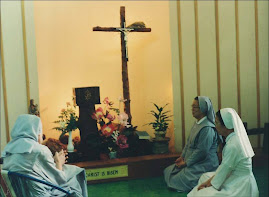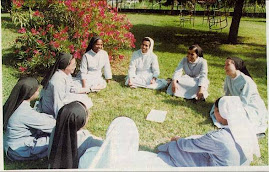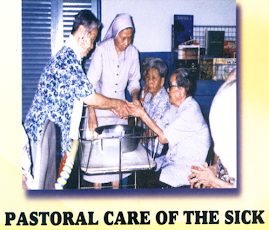by Sister Julie on November 16, 2008
Ever wonder if God might be calling you to become a Catholic nun or sister? Don’t know where to begin now that you feel drawn to looking into religious life?
You’ve landed on the right page. Here you’ll learn about how to become a Catholic sister or nun. You’ll get a general idea of where to start, what the general logistics are, and some helpful hints from someone who’s been there and is now a Catholic sister. My intention here is just to get you started on your way. As you move towards checking out a religious community, check in with vocation director who can give you specifics about how that particular community goes about the steps for becoming a nun.
Prerequisites for Becoming a Catholic Sister or Nun
1. You must be a Catholic woman.
If you are not Catholic, there are other forms of religious life in Christian communities that are not exclusively Catholic (e.g.,
Benedictine Women of Madison) as well as in other religious traditions (e.g.,
Buddhist nuns). If you wish to become a Catholic, talk with a pastor at a local Catholic parish.
2. You must be single.
You cannot be currently married in the eyes of the Church. If you are, you must obtain an annulment in order to consider becoming a nun. Widows may validly become nuns.
3. You must not have any dependent children.There are many women who have children who become nuns. The children, however, must no longer be dependent.
4. You must not have any debts upon entrance to the novitiate.
Novitiate is usually a year or two into the formal process of becoming a nun. If you do have debts, work to eliminate them. Don’t stop looking into a religious community because of a student loan or something similar. Talk with the vocation director about how to proceed.
5. You must be healthy.
It’s important that you be physically and psychologically able to engage in the mission of the religious community. However “healthy” is a relative term and doesn’t automatically exclude people with managed illnesses or disabilities. This is an important thing to discuss with the vocation director.
6. You must 18 to 40-ish years old.
Although the age limit used to be confined to 18-25, communities accept women up to age 40, and many accept women beyond their 40s and into their 50s. If you are in the higher range of age, don’t be discouraged from pursing religious life. Often this is addressed on a person-by-person basis.
7. Other considerationsA college degree is not an absolute prerequisite; however, many religious communities do encourage that you have at least a bachelor’s degree prior to entering. Professional experience (not necessarily a full-fledged career, though that is welcomed too) is also encouraged prior to entering.
How to Become a Nun1. Pray
The most important place to begin is to pray (or continue praying) about this call you sense. Your feeling that God is calling you is not some fluke or self-conjured up idea; it is a gift from God, an invitation into a deeper relationship with God. No matter how your vocation ends up expressing itself (nun, spouse, parent, teacher, advocate, etc.), you are being called right here, right now, to draw closer to God.
Be open to listening to God, no matter how crazy or confusing it feels. Embrace the possibility of whatever God has in mind for you. It may be a radical shift to a different way of life than you imagined for yourself, or it may be something you’ve kinda known all along. And it could be both!
Remain faithful to pray even when it is difficult or feels like it is going nowhere. Spend more time in prayer and/or be more intentional in the prayer time that you already have. If you are used to praying first thing in the morning, consider praying again before you go to bed. Review your day and ask God to help you see how God has been with you in the daily stuff of life. If you are drawn to the Rosary, consider praying the Rosary with the specific intention of knowing more deeply how Mary and how Jesus responded to their calling.
Read scripture, particularly the stories of people trying to figure out how God is calling them and how they can respond. Here are some of those stories (for more check out this listing of Bible stories from
vocations.ca):
Mary (
Luke 1:26-38)
Ruth (
Book of Ruth 1:15-18)
Disciples (
John 1:35-50)
Jeremiah (
Jeremiah 1: 4-10)
Isaiah (
Isaiah 6:1-10;
49:1-6)
Samuel (
1 Samuel 3:1-21)
John and Peter (
Matthew 4:18-22)
Paul (
Romans 1:1-7;
Acts of the Apostles 9:1-19)
Imagine yourself in the story. How would you respond? What words is God speaking to you?
Pray with others. Participate in the Eucharistic Liturgy, attend to a bible study or faith-sharing group, pray with others who can encourage and support you.
2. Meet Nuns
Do you know any real nuns? Do you have nuns at your parish or school? Do you work with nuns? Getting to know nuns personally is a very important step in becoming a nun because each one is an example of how to live religious life “for real”. Also, interacting with nuns gives you a chance to begin to imagine yourself as a nun and see how it “fits”. You don’t even have to tell the nuns that you are scoping them out! I spent a good amount of time doing “nun surveillance” before ever saying anything to them (well, just one of them) about what I was thinking. Some nuns “fit” with how I felt God calling me; others, while stellar examples of religious, didn’t quite fit me. I learned that that was okay and that religious life is very diverse, and along the way I found that I was called to the IHM way of religious life.
What are some ways you can do nun surveillance or interact with nuns?
attend Mass or a prayer service at a religious community’s Motherhouse or convent
go on retreat held by or led by nuns
participate in a “nun run” (an event in which you travel from convent to convent with other discerning women in order to check out communities and get to know a variety of nuns)
take a course or workshop taught by a nun
pretend you have a problem with a paper you’re writing for your nun professor so you get one-on-one time (I had this mastered, but then I think she figured it out — she never let on!)
invite a nun out to dinner or a movie
help a nun fix her computer or start a Facebook page
volunteer at a convent by helping with transportation needs or by organizing a craft experience or by shelving library books or by participating in some kind of social justice advocacy with them
get a spiritual director who is a nun
attend an event at which there is likely to be a high population of nuns
If you are in a place where there are no nuns around, you can do online nun surveillance.
read
A Nun’s Life and check out other
Blogs by Catholic Nuns and see what the nuns are like — lurk all you want
visit religious communities’ websites (VISION Vocation Network has a great
directory of Catholic religious communities online) — many sisters’ websites feature personal stories as well as info on the community itself
sign up for
Facebook and friend a nun (I’m on FB and would be happy to be friended!)
find websites of ministries run by or sponsored by nuns to get a feel for their ministries (e.g.,
Sandalstrap,
Mount Providence Child Development Center,
EarthSpirit,
Villa Maria Academy,
Heartworks Art Ministry)
3. Talk with a MentorThere’s nothing like saying something out loud to make it really real! So start talking to trusted people about your attraction to religious life. These mentors could be family or friends. You might have a dear aunt or a close cousin that you can share you thoughts without fear of being discouraged. Talk with friends whom you know that will be supportive of you while you explore religious life and this feeling of being called to become a nun.
You may also consider talking with someone like a nun or a priest or a chaplain. There are many leaders in parishes and schools that are there to listen and encourage you on your spiritual journey. A more intense way of doing this is by looking into spiritual direction. A spiritual director is someone who is trained to help you discern, think, and pray about how God is moving in your life. Most are familiar with religious life (many in fact are religious) and can be great mentors and sounding boards as you consider where you are and where you are going.
4. Contact a Religious Community
You’ll know when it’s the right time for you to move from learning about nuns and religious life to formally exploring religious life with a specific community. It can be a leap of faith making this transition, but remember, just because you contact a religious community doesn’t mean you are signed up for life. Religious communities know that it can take a while for people to get to know them and religious life in general. They welcome you where you are at and are there to help you discern if God is calling you to their particular community.
So how do you do contact a religious community? If you know a nun in the community you are attracted to, ask her. She’ll be a good companion (if you want her to) along the way and will introduce you to the Vocation Director and other sisters if you so desire. If you don’t know a nun personally in the community, contact the Vocation Director of the community directly. You can find her name and contact info on the community’s website. You can also contact the Vocations Office in your diocese. They have tons of info to help you discern and find a community that “fits” for you. To find your diocese’s vocation office, consult the
U.S. Catholic Bishops’ directory of dioceses.
VISION Vocation Network also has their
directory of Catholic religious communities which you can use to find contact info for Vocation Directors. They also have a very innovative and helpful online
Vocation Match feature.
5. Work with the Vocation Director
The vocation director of a particular religious community is the official person who helps you to get to know the community and to discern God’s call in your life. The Vocation Director is a member of the community that you are considering joining. Her job is to help you get to know the community and to help the community get to know you. She’ll be the one that leads you through all the formal steps of becoming a nun within that particular religious community. While you are relating with the vocation director, you are not under any obligation to stay with that community. You may decide to look into other communities or to date someone. Don’t be afraid to do this. Explore and experience the things you need to in order to find out if religious life with a particular community is for you. Vocation directors are very understanding of this and know that it is a normal part of discerning.
As you come to your own sense of commitment to becoming a nun, you’ll grow in your own sense of wanting to be committed to this particular community. That’s when you move toward “breaking up” with other communities you’ve looked into or with the person you’ve been dating. You’ll know when the time is right.
Some things that you might do as you work with a vocation director:
meet regularly in person or by phone
attend a vocation retreat with other women that the vocation director is working with
go to the sisters’ community events such as Mass, particular meetings or workshops just for the sisters, etc.
explore the community’s motherhouse and campus
learn about the community’s charism, spirituality, history, and mission
visit organizations and ministries sponsored by the community
attend vocation-oriented events within the diocese
help her get to know you by having her visit your school or job or taking her to your favorite hang-outs
discuss religious life and the vows
When you and the vocation director are ready to officially move forward with your desire to join the community, you’ll probably move more into working on the formal steps for joining the community:
address the practical requirements to enter the community (Canon Law, finances, property, psychological and physical assessments, etc.)
envision your transition into the community (when, where, how)
formally meet with other members of the vocation team and with the congregational leader (General Superior)
The vocation director will lead you through all of these things and is there as your advocate. She’s there to encourage you, challenge you, and pray with you. Although she is the official link to the community, you are encouraged to befriend others in the community.
6. Join the Community
Once you and the community have discerned that yes, in fact, God is calling you to one another, you go through the formal steps of joining. These include:
Aspirancy / Pre-Candidacy (more to come on each of these)
Postulancy / Candidacy
Novitiate
First Vows
Final Vows
Source:
http://anunslife.org/how-to-become-a-catholic-nun/




 Ephesians 4: 30
Ephesians 4: 30











